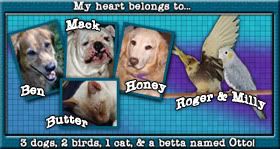I got a news letter today saying that although we think our dogs feel guilty, they don't have the ability to.
I think that everytime Hannah and Copper do something they shouldn't have done they feel guilty. I know Hannah has done something wrong even befor I find the chewed up slipper or box of kleenex. She gets this really sad look on her face and she hangs her ears real low and walks around the house very slowly, then I know I better go look around and see what she has gotten into.
What do you think do your dogs feel guilty when they do something bad ???






 Reply With Quote
Reply With Quote She is often quite pleased with herself for getting my attention even though in a negative way!
She is often quite pleased with herself for getting my attention even though in a negative way! 

 Makes sense to me Carrie - I know if I catch my dog in the act of stealing something off the table, she cringes like she knows she's going to get yelled at - where if she's already stolen it and has it on the floor - she acts like she did nothing wrong.
Makes sense to me Carrie - I know if I catch my dog in the act of stealing something off the table, she cringes like she knows she's going to get yelled at - where if she's already stolen it and has it on the floor - she acts like she did nothing wrong.


Bookmarks